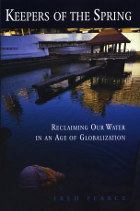
Water is in the air we breathe and beneath the ground we walk on. The very substance of life, it makes up as much as 60 percent of the human body. And yet, for one billion people there is such a thing as life without water. These are the people we meet in Dry--those who live in the dry lands of Africa, Asia, the Pacific, and the Americas, eking out an existence at once remarkable and mundane between craggy mountains, near oases, or close to well-springs surrounded by cracked earth or shifting sands.
From the ingenuity of the highland people of Chile's Atacama desert who use giant nets to capture water from clouds of fog, to the ancient wisdom that protects the grazing lands of Kenya's Masai, this beautifully illustrated book tells the diverse stories about people in very hot, very cold, or very high places, who spend their lives collecting, chasing, piping, and trapping the water that life requires--all the while taking great care that no form of life, plant or animal, benefits at the expense of another.
In a world of finite resources, where the struggle for shrinking sources of water intensifies daily, these stories--collected over three years by photographers, writers, and scientists from four continents--are a source of hope and wonder. This book contains a wealth of information and images designed to further awareness of the vast array of life that is carried on precariously yet proudly on the earth's dryest lands.

Water has long been the object of political ambition and conflict. Recent history is full of leaders who tried to harness water to realize national dreams. Yet the people who most need water-farmers, rural villages, impoverished communities-are too often left, paradoxically, with desiccated fields, unfulfilled promises, and refugee status.
It doesn't have to be this way, according to Fred Pearce. A veteran science news correspondent, Pearce has for over fifteen years chronicled the development of large-scale water projects like China's vast Three Gorges dam and India's Sardar Sarovar. But, as he and numerous other authors have pointed out, far from solving our water problems, these industrial scale projects, and others now in the planning, are bringing us to the brink of a global water crisis.
Pearce decided there had to be a better way.
To find it, he traveled the globe in search of alternatives to mega-engineering projects. In Keepers of the Spring, he brings back intriguing stories from people like Yannis Mitsis, an ethnic Greek Cypriot, who is the last in his line to know the ways and whereabouts of a network of underground tunnels that have for centuries delivered to farming communities the water they need to survive on an arid landscape. He recounts the inspiring experiences of small-scale water stewards like Kenyan Jane Ngei, who reclaimed for her people a land abandoned by her government as a wasteland. And he tells of many others who are developing new techniques and rediscovering ancient ones to capture water for themselves.
In so doing, Pearce documents that these "keepers" are not merely isolated examples, but collectively constitute an entire alternative tradition of working with natural flows rather than trying to reengineer nature to provide water for human needs.
The solution to our water problems, he finds, may not lie in new technologies-though they will play a role-but in recovering ancient traditions, using water more efficiently, and better understanding local hydrology. Are these approaches adequate to serve the world's growing populations? The answer remains unclear. But we ignore them at our own peril.
READERS
Browse our collection.
PUBLISHERS
See BiblioVault's publisher services.
STUDENT SERVICES
Files for college accessibility offices.
UChicago Accessibility Resources
home | accessibility | search | about | contact us
BiblioVault ® 2001 - 2024
The University of Chicago Press









